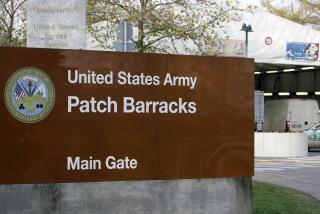Terror events and crime form bases of State Department worldwide alert
- Share via
The State Department’s recent worldwide warning and renewed warnings on North Korea and Honduras may give you pause, if you didn’t already feel uneasy after the Paris attacks on Nov. 13 that killed 130 and injured hundreds, the downing of a Russian jetliner in Egypt on Oct. 31, killing 224 people, and the continuing tension between Turkey and Russia after Turks shot down a Russian military jet on Nov. 24.
Worldwide alert
The Nov. 23 worldwide warning joins a worldwide caution in reminding U.S. citizens of the threats of terrorism. The warning notes that Americans should be especially careful at holiday-themed gatherings and that crowds should be avoided.
In a statement last week, the American Society of Travel Agents criticized the warning as too broad and lacking specifics.
The caution is more explicit. “Authorities believe there is an increased likelihood of reprisal attacks against U.S., Western and coalition partner interests throughout the world, especially in the Middle East, North Africa, Europe and Asia,” it says.
Conspicuous by their absence: Antarctica, Australia, New Zealand and the Latin American countries, although none of these places is without difficulties.
For those planning a trip, the detail on the caution may prove helpful, especially its discussions of what terror groups are active in which regions.
To read more: www.travel.state.gov
North Korea
The updated warning on North Korea emphasizes again the vulnerability of American citizens, even those traveling with a group. “North Korea has even detained several U.S. citizens who were part of organized tours,” the warning says.
“Do not assume that joining a group tour or using a tour guide will prevent North Korean authorities from detaining you or arresting you. Efforts by private tour operators to prevent or resolve past detentions of U.S. citizens in [North Korea] have not succeeded in gaining their release.”
To read more: www.lat.ms/1N053Xd
Honduras
An Oct. 30 warning on Honduras has some good news, if it can be called that: The homicide rate in the Central American country, which the warning says is one the worst in the world, has improved: Instead of 86.5 homicides per 100,000 people the country experienced in 2011, the number dropped to 66 in 2014 and “mid-year estimates in July 2015 predict a lower rate for 2015.”
Much of this is related to narco-crime, the warning notes, but it also reports that sexual assault is a “concern.”
“Most Honduran local police and medical staff do not have the capacity to properly handle evidence collection and medical care of sexual assault cases,” it notes.
Group travel apparently is safer, it says, and tourist areas such as Roatán do not seem to be subject to as much violence because of security measures that those in the travel industry have implemented.
But, the warning notes, even cruise passengers who are there for only a short time should make sure they are protected, which means if they are going ashore, they need to be sure they are in the hands of a reputable tour group.
It also notes that U.S. government personnel are restricted from traveling to the department of Gracias a Dios “due to credible threat information against U.S. citizens by criminal and drug trafficking organizations.”
Gracias a Dios translates to “thank God” or “thank heavens.”
To read more: www.lat.ms/1Q9yn1W
Taking precautions
Recent “On the Spot” columns discussing travel insurance mentioned the pros and cons of buying a policy, but there’s one protection that’s free and perhaps more important in light of world unrest detailed here. It’s the Smart Traveler Enrollment Program, or STEP, offered through the State Department.
By telling the State Department where you are, in an emergency you may be more easily found. You’ll also receive updates on countries you have traveled to.
You maybe uncomfortable letting the State Department know your itinerary, and that’s understandable. But in an emergency, there may be more discomfort for those at home waiting to find out whether you are OK.
Info: step.state.gov/step/
Sources: U.S. Department of State, Associated Press
More to Read
Sign up for The Wild
We’ll help you find the best places to hike, bike and run, as well as the perfect silent spots for meditation and yoga.
You may occasionally receive promotional content from the Los Angeles Times.







